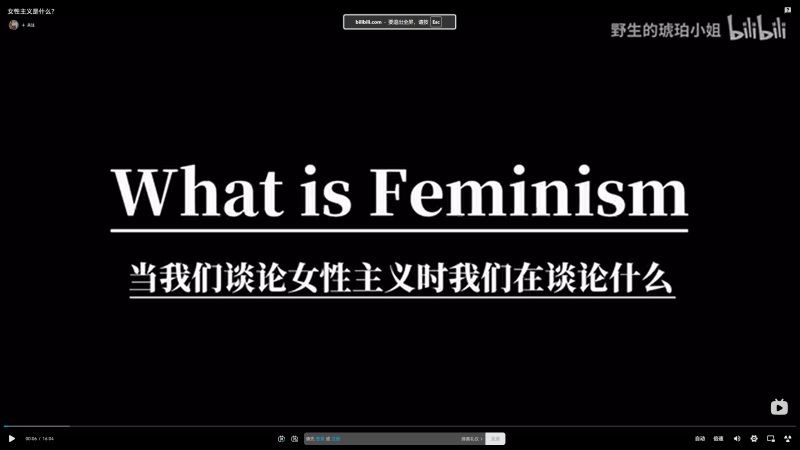We Should All Be Feminists
Video Description
In this famous TEDxEuston talk, writer Chimamanda Ngozi Adichie shares her personal insights and definition of feminism. Through personal stories and observations, she reveals gender inequality and the negative effects traditional gender roles have on both men and women. The speech deeply explores gender injustices in society, calls for changing the way boys and girls are raised, and emphasizes that culture is created by people and therefore can be changed to achieve true gender equality.
Related Topics
Chimamanda Ngozi Adichie’s 2012 TEDxEuston talk “We Should All Be Feminists” has become one of the most influential feminist speeches of the 21st century. With over 6 million views on YouTube and later adapted into a bestselling book, Adichie’s words have sparked global conversations about gender equality and redefined feminism for a new generation.
A Personal Journey to Feminism
Adichie begins her talk by sharing the story of how she was first called a feminist—initially as an insult by a childhood friend who told her she was “too interested in gender.” This personal anecdote immediately establishes the speech’s intimate, storytelling approach to complex political ideas. Rather than beginning with abstract theory, Adichie grounds her argument in lived experience.
Redefining Feminism
One of the speech’s most powerful contributions is Adichie’s accessible definition of feminism: “a person who believes in the social, political, and economic equality of the sexes.” This simple, clear definition strips away the negative stereotypes and misconceptions that have been attached to feminism, making the concept approachable for skeptics and newcomers alike.
The Damage of Gender Expectations
Through a series of compelling anecdotes, Adichie illustrates how rigid gender roles harm both men and women. She describes how boys are taught to suppress emotions and fear vulnerability, while girls are taught to make themselves small and prioritize likability over authenticity. These observations resonate globally because they transcend cultural boundaries while acknowledging cultural specificity.
Cultural Critique and Change
Adichie challenges the notion that oppressive gender practices are immutable cultural traditions. Her assertion that “culture does not make people; people make culture” has become a rallying cry for those working to change harmful cultural practices. This perspective empowers individuals and communities to actively reshape cultural norms rather than passively accepting them.
The Global Relevance of Local Stories
While Adichie draws heavily from her Nigerian background, her observations about gender inequality speak to universal experiences. She skillfully weaves together examples from Nigeria and her experiences living in the United States, demonstrating how patriarchal systems operate across different cultural contexts.
Economic Arguments for Gender Equality
The speech doesn’t rely solely on moral arguments for gender equality. Adichie makes compelling economic cases, discussing how societies benefit when women are able to fully participate in economic life. This practical approach helps broaden the appeal of feminist arguments beyond those who are already convinced of their moral necessity.
The Problem with “Women’s Rights”
Adichie critiques the language of “women’s rights,” arguing that it positions gender equality as a special interest rather than a human rights issue. By reframing the discussion around human rights and social justice, she challenges audiences to see gender equality as fundamental to a just society.
Impact on Popular Culture
The speech’s influence extended far beyond academic or activist circles. When Beyoncé sampled Adichie’s words in her 2013 song “***Flawless,” it brought feminist ideas to mainstream pop culture in unprecedented ways. This collaboration demonstrated how feminist ideas could reach new audiences through creative partnerships.
Educational and Academic Influence
“We Should All Be Feminists” has become required reading in numerous university courses and has been distributed for free to students in countries including Sweden and Nigeria. Its inclusion in educational curricula has introduced countless young people to feminist ideas in an accessible, engaging format.
Intersectionality and Limitations
While Adichie’s speech has been praised for its accessibility, some critics have noted its limited discussion of intersectionality—how race, class, sexuality, and other identities interact with gender. However, Adichie has addressed these critiques in later works and speeches, expanding on the foundation laid in this influential talk.
The Evolution of the Message
Since 2012, Adichie has continued to develop and refine her feminist thinking through additional books, speeches, and interviews. “We Should All Be Feminists” serves as a foundational text that has grown into a broader body of work addressing contemporary feminist issues.
Global Conversations and Translations
The speech has been translated into dozens of languages and has sparked feminist movements and conversations worldwide. Its simple message and powerful delivery have made it a starting point for countless individuals beginning to explore feminist ideas.
Legacy and Continuing Relevance
More than a decade after its delivery, “We Should All Be Feminists” remains relevant and influential. Its message that gender equality benefits everyone continues to resonate in ongoing conversations about workplace equality, parenting, education, and social justice.
Conclusion
Chimamanda Ngozi Adichie’s “We Should All Be Feminists” succeeds because it makes the complex personal and the political accessible. By sharing her own story and observations, Adichie created a feminist text that speaks to people across cultures, ages, and backgrounds.
The speech’s enduring popularity demonstrates the hunger for feminist messages that are both intellectually rigorous and emotionally resonant. Adichie’s contribution to feminist discourse lies not just in what she said, but in how she said it—with clarity, humor, and humanity that continues to inspire new generations of feminists around the world.
Through this speech, Adichie has helped reshape contemporary feminism, making it more inclusive, accessible, and globally relevant. Her words continue to challenge, inspire, and educate, proving that the best feminist texts are those that speak to both the mind and the heart.
Video Info
评论与讨论
与其他观众一起讨论这个视频
加入讨论
与其他观众一起讨论这个视频
加载评论中...

